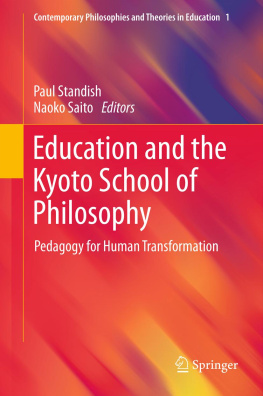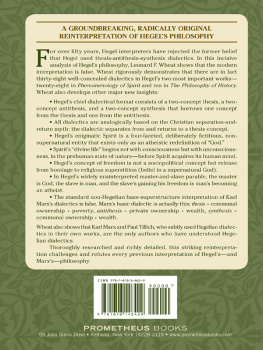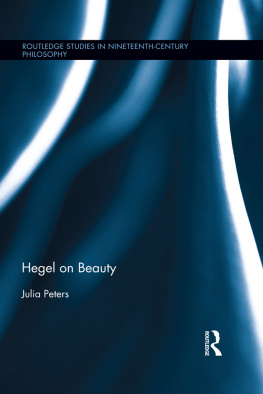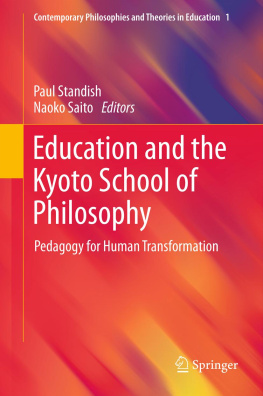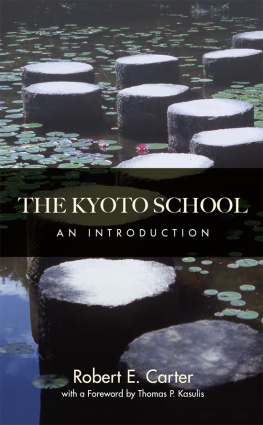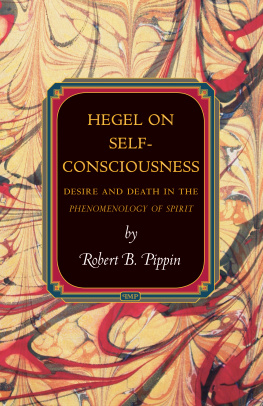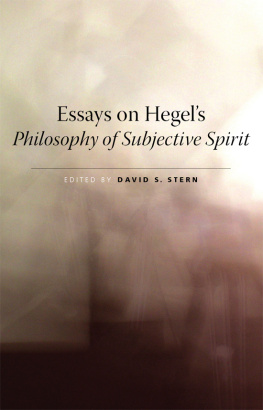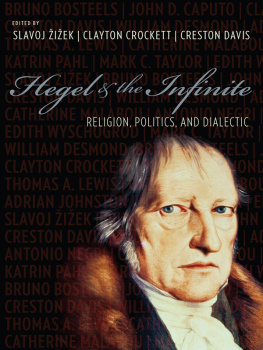About the Author
Peter Suares pursued doctoral studies at the University of California at Berkeley, specializing in cultural anthropology of Japan, Japanese literature, psychology, and sociology, and at the Graduate Theological Union in Berkeley, where he studied Japanese religious philosophy. He has lived in Europe, Japan, and the United States. He is active as a freelance writer in the San Francisco Bay Area.

The Kyoto Schools Takeover of Hegel
I am grateful to Dr. Richard Payne, my former academic advisor and current friend, for providing many forms of support during this project; to Dr. George De Vos for encouragement and countless hours of inspiring discussion; to Mary Ann McEwan, whose editorial dedication helped improve the linguistic quality of the manuscript; and to my wife Isabelle, who contributed to the writing of this book in myriad ways, concrete and intangible.
Introduction
Georg Wilhelm Friedrich Hegel (1770-1831) conceived one of the last systems of Western metaphysics, a work standing at its zenith and a perfection of its fundamental conceptions. Toward the end of his life, his system gave rise to a distinctive philosophical school that carried on his legacy in fields as diverse as metaphysics, theology, logic, philosophy of law, ethical and social theory, political philosophy, and theory of art. Hegelianism radiated from its native Germany to become a major philosophical current in Denmark, Norway, Holland, France, Italy, and the Slavic countries. It was received positively in America, as well, where its political and historicist aspects stirred interest initially among immigrant German populations of St. Louis and Cincinnati. Soon, the Hegelian wave reached philosophy proper, where it became a factor in shaping the thought of, for instance, Josiah Royce (1855-1916). In Great Britain, despite a spirited opposition to the speculative character of Hegels ideas, their metaphysical and methodological originality garnered a following of thinkers such as Thomas Hill Green (1836-1882), Edward Caird (1835-1908), and Francis Herbert Bradley (1846-1924).
Because of its richness and complexity, Hegels system lends itself to many, often conflicting interpretations. A philosophically idealistic and politically conservative reading became the hallmark of old Hegelians whose ranks include Johann Karl Rosenkranz (1805-1879) and Kuno Fischer (1824-1907). These Althegelianer remained faithful to the teachings of the master, extending them further in established religious, ideological, and political directions. On the opposite end, the early 1840s witnessed the emergence of new or young Hegelians ( Neuhegelianer or Junghegelianer ) who used Hegels method to pursue goals increasingly at odds with his own. That later branch produced atheist, reformist figures such as Ludwig Feuerbach (1804-1872), Max Stimer (1806-1856), Bruno Bauer (1809-1882), and Karl Marx (1818-1883).
In the second half of the nineteenth century, Hegels idealist system was eclipsed on various fronts by Neo-Kantianism, Bismarcks (1815-1898) political realism, European and American positivism, empiricism, and pragmatism. But its developmental view of history, appreciation for the concrete reality of human existence, and unique method continued to conquer minds in twentieth-century Germany, Italy, France, Eastern Europe, and the United States. Hegels ideas found their way into the political theories of Marxism-Leninism and fascism, into existentialism and existential anthropology, phenomenology, literature, and aesthetics. The list of names directly or indirectly associated with Hegels philosophy includes Wilhelm Dilthey (1833-1911), Benedetto Croce (1866-1952), Ernst Bloch (1885-1977), Georg Lukacs (1885-1971), Martin Heidegger (18891976), Jean-Paul Sartre (1905-1980), Jean Hippolyte (1907-1968), Jean Piaget (1896-1980), and dozens of others.
One example of the way Hegels ideas took hold far from his native Germany is their reception in modem Japan. His Phenomenology of Spirit From 1877 on, American educator and orientalist Ernest Fenollosa (1853-1908) taught courses on the German philosopher at Tokyo Imperial University. Since the late nineteenth century, Hegels works have been translated into Japanese in advance of Kants, and the list of Japanese publications on his philosophy now fills over three hundred pages. The pace of publication accelerated since the hundredth anniversary of Hegels death in 1931, the year around which the growing popularity of his philosophy of history began to eclipse the interest in Neo-Kantianism dominating Japans philosophical circles until that time.
There are several reasons for Japans fascination with Hegel. In the first few decades following the Meiji Restoration of 1868, the country held German culture in deep esteem and accorded it a place of honor in the state curriculum. Hegel was seen naturally as a major representative of German thought. Another reason lies in the scope and the character of his achievement. Hegels philosophy took upon itself the task of interpreting, according to its principles, everything known to man. It strived to provide a complete account of reality and to build up that account into a system. This could not but strike a sympathetic chord with the Japanese people, fond as they are of the tangible and the phenomenal, and please their sense for organization and exhaustiveness. Of appeal to the Japanese public was also Hegels theory of moral substance and objective spirit manifested in social forms. The philosophers appreciation for the socializing power of the community and its traditions, palpable in that theory, found resonance in the Japanese propensity to derive individual identity from the group and the community of ones belonging. The social orientation of the Japanese held firm despite their avid but superficial experimentation with Western individualism and subjectivity since about the turn of the twentieth century. From the other side of the globe, Hegels views offered a soothing reassurance for a core Japanese value.
While engaged in patient examination of one temporal aspect of reality after another, Hegel never lost sight of the ubiquitous presence of the eternal. That enduring focus was no less characteristic of his political philosophy, making it agreeable to the absolutist tendencies of the Japanese state of that time. Prevailing over numerous liberal subcurrents, the overall trend of early twentieth-century Japan was conservative. It favored the strengthening of national polity ( kokutai ), an immutable structure of the racially homogeneous family-state with the divine Imperial household at its center. Hegels politically conservative view of the absolute spirit developing through history toward the perfection of its own consciousness manifested in the state was syntonic with that ideology. Ironically, Hegels principles (recast in the Marxist form) were exploited in equal measure by the Marxist foes of the Japanese establishment.
Japans Buddhist heritage fostered its appreciation for the affinities between Hegelian and Mahyna metaphysics. For Hegel, all beings are determined by otherness. More plainly, everything finite is by nature relative to something else; a thing is defined through the complex of its finite relationships. This quality was perceived to accord with the Mahyna notion of emptiness ( nyat ), according to which things have no inherent nature or reality, except in a conventional sense. In particular, the Kegon school of Buddhism postulates mutual identity of phenomena that, while appearing to be possessed of independent existences, lack fixed boundaries and interpenetrate. Having their identities grounded in something other than themselves, yet maintaining their individuality, finite beings in both views can be characterized as both transcendent and immanent to themselves.


